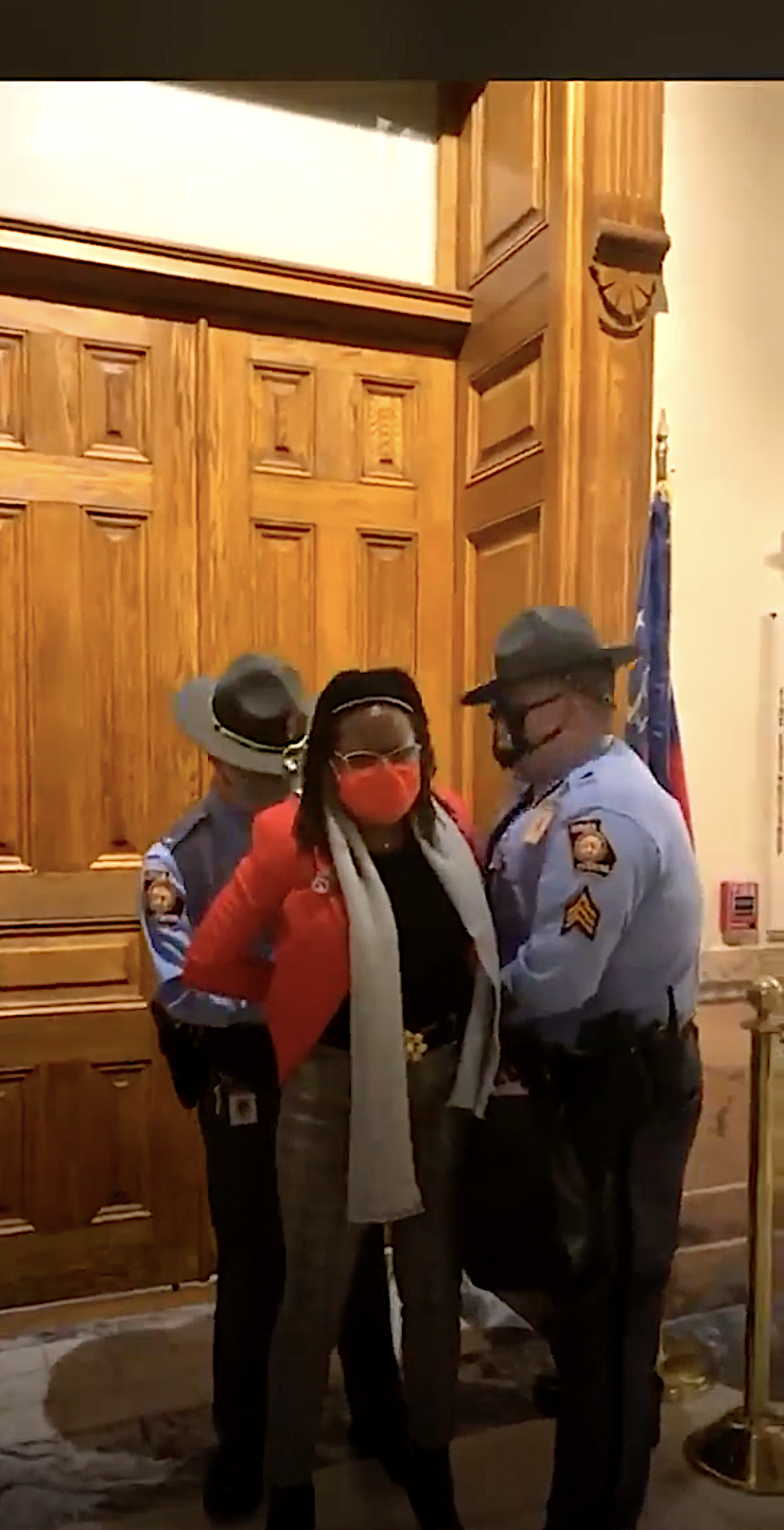Georgia police arrest Black lawmaker for knocking as Gov. Brian Kemp signed new voting restrictions


A free daily email with the biggest news stories of the day – and the best features from TheWeek.com
You are now subscribed
Your newsletter sign-up was successful
Georgia Gov. Brian Kemp (R) signed into law a new measure to restrict voting access in the state, shortly after the Republican-led legislature passed it along party lines. Georgia voted for President Biden in November, then elected two Democrats to the U.S. Senate in a January runoff election. "After the November election last year, I knew, like so many of you, that significant reforms to our state elections were needed," Kemp said. The Atlantic's Adam Serwer had an alternate explanation.
The new law makes it harder to request and drop off absentee ballots, changes early voting hours, replaces the elected secretary of state as head of the state election board with an appointee of the legislature, and gives that board the power to remove and replace county election officials. "That provision is widely seen as something that could be used to target Fulton County, a Democratic stronghold covering most of Atlanta," The Associated Press reports. The law also "bars outside groups from handing out food or water to people in line to vote."
"As always, the burden of these changes falls most heavily on voters of color — those the Voting Rights Act was designed to protect," Andrea Young, executive director of the ACLU of Georgia, said in a statement.
The Week
Escape your echo chamber. Get the facts behind the news, plus analysis from multiple perspectives.

Sign up for The Week's Free Newsletters
From our morning news briefing to a weekly Good News Newsletter, get the best of The Week delivered directly to your inbox.
From our morning news briefing to a weekly Good News Newsletter, get the best of The Week delivered directly to your inbox.
As Kemp was signing the law behind closed doors, state Rep. Park Cannon (D) was arrested by Capitol police for knocking. Cannon, a Black woman who represents Atlanta, was charged with felony obstruction of law enforcement and disrupting a session of the General Assembly. She faces 1 to 5 years in prison if convicted, AP reports.
Cannon "was advised that she was disturbing what was going on inside and if she did not stop, she would be placed under arrest," George State Police spokesman Lt. W. Mark Riley said. "Rep. Cannon refused to stop knocking on the door."
Tamara Stevens, an activist who was with Cannon, told The Atlanta Journal-Constitution that Cannon was not being disruptive or disrespectful. "She knew he was signing a bill that would affect all Georgians — why would he hide behind closed doors?" Stevens said. "This isn't a monarchy." Peter Weber

A free daily email with the biggest news stories of the day – and the best features from TheWeek.com
Peter has worked as a news and culture writer and editor at The Week since the site's launch in 2008. He covers politics, world affairs, religion and cultural currents. His journalism career began as a copy editor at a financial newswire and has included editorial positions at The New York Times Magazine, Facts on File, and Oregon State University.
-
 6 exquisite homes with vast acreage
6 exquisite homes with vast acreageFeature Featuring an off-the-grid contemporary home in New Mexico and lakefront farmhouse in Massachusetts
-
 Film reviews: ‘Wuthering Heights,’ ‘Good Luck, Have Fun, Don’t Die,’ and ‘Sirat’
Film reviews: ‘Wuthering Heights,’ ‘Good Luck, Have Fun, Don’t Die,’ and ‘Sirat’Feature An inconvenient love torments a would-be couple, a gonzo time traveler seeks to save humanity from AI, and a father’s desperate search goes deeply sideways
-
 Political cartoons for February 16
Political cartoons for February 16Cartoons Monday’s political cartoons include President's Day, a valentine from the Epstein files, and more
-
 ABC News to pay $15M in Trump defamation suit
ABC News to pay $15M in Trump defamation suitSpeed Read The lawsuit stemmed from George Stephanopoulos' on-air assertion that Trump was found liable for raping writer E. Jean Carroll
-
 Judge blocks Louisiana 10 Commandments law
Judge blocks Louisiana 10 Commandments lawSpeed Read U.S. District Judge John deGravelles ruled that a law ordering schools to display the Ten Commandments in classrooms was unconstitutional
-
 ATF finalizes rule to close 'gun show loophole'
ATF finalizes rule to close 'gun show loophole'Speed Read Biden moves to expand background checks for gun buyers
-
 Hong Kong passes tough new security law
Hong Kong passes tough new security lawSpeed Read It will allow the government to further suppress all forms of dissent
-
 France enshrines abortion rights in constitution
France enshrines abortion rights in constitutionspeed read It became the first country to make abortion a constitutional right
-
 Texas executes man despite contested evidence
Texas executes man despite contested evidenceSpeed Read Texas rejected calls for a rehearing of Ivan Cantu's case amid recanted testimony and allegations of suppressed exculpatory evidence
-
 Supreme Court wary of state social media regulations
Supreme Court wary of state social media regulationsSpeed Read A majority of justices appeared skeptical that Texas and Florida were lawfully protecting the free speech rights of users
-
 Greece legalizes same-sex marriage
Greece legalizes same-sex marriageSpeed Read Greece becomes the first Orthodox Christian country to enshrine marriage equality in law
